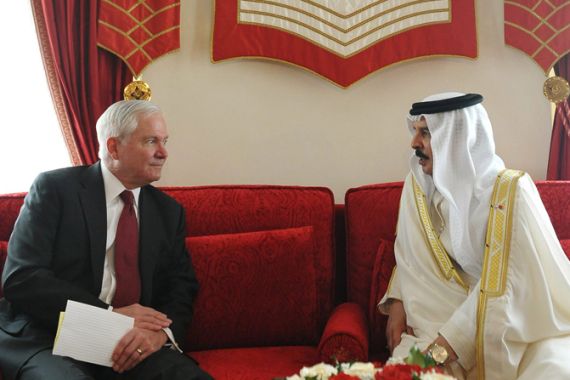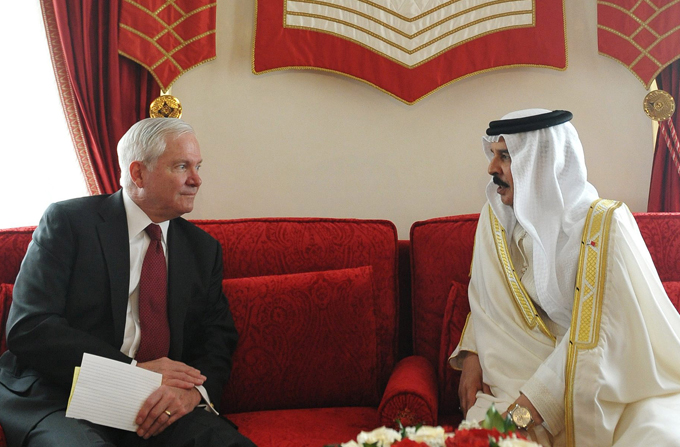Crackdown in Bahrain: Notes from the field
Despite the protests, the Al Khalifa family does not look like it will be dethroned, but that may come with a cost.

 |
| Robert Gates, the US defence secretary, met with Bahrain”s king Hamad bin Isa Al Khalifa shortly before the GCC military stepped into Bahrain, pointing to possible US complicity and foreknowledge of the Gulf intervention [GETTY] |
MANAMA — Against all advice, I flew to Bahrain to witness first-hand the confrontation between the royal authorities and the thousands of protesters in the streets.
It took a while to get a taxi, because roadblocks have discouraged people from driving. We drove through the eerily empty streets and easily passed through two makeshift checkpoints manned by teenaged shebab.
My young driver was full of enthusiasm about the protest, explaining that the demonstrations were peaceful and not driven by Sunni-Shia sectarianism, which was just a pretext for the regime to justify its control.
As we neared the Pearl roundabout – the epicentre of the protest – I asked him if it would be safe for me to go there.
He assured me that it would be perfectly safe and that I would find whole families – including women and children – peacefully camped out there.
They were there because the ruling Al Khalifa family so far had failed to persuade them that they are sincere about political reform.
While the crown prince had offered to meet the opposition (the Shia Wifaq party and other groups) had refused, insisting that the rulers first make a good will gesture such as accepting a constitutional reform committee of their choosing.
Instead the king took the highly provocative step of calling in outside military forces (the mostly Saudi “Peninsula Shield” of the Gulf Cooperation Council). So the protests continued.
My driver seemed optimistic that “people power” would bring democracy to Bahrain as it had in Tunisia and Egypt.
How wrong he was.
Suppression
The next morning, just after 6 am, I looked out of my hotel window across largely vacant land in the direction of the Pearl roundabout.
The crackdown was beginning. I could see a steady line of armoured personnel carriers inching down a road toward the roundabout.
I counted around thirty of them. Four helicopters hovered over the area with a fifth surveying at a higher altitude. Then I could see plumes of white and black smoke rising from behind and between the buildings near the roundabout, apparently from the burning tents of the protesters.
An hour later I saw another huge column of black smoke billowing up. What I couldn’t see were the Bahraini and Saudi forces attacking the protesters (killing two and injuring many more) and burning their tents.
Three other protesters were killed in the serious clashes in the Sitra island area and elsewhere. And the Salmaniyya hospital complex was being surrounded by security troops, preventing ambulances from entering or leaving.
A Bahraini friend could not contain his emotion in describing to me how members of his extended family in villages outside Manama had their houses broken into by thugs affiliated with the internal security organisations.
He said he felt shame and humiliation to see the police break up a peaceful demonstration on the Bahrain University campus. The offices of the Waad party, a centrist, non-sectarian organisation were vandalised and set on fire.
Justifying brutality
Clearly the authorities have decided that force, not negotiation, will be their preferred strategy.
Here is how they justify it: Bahrain will not follow the path of Tunisia and Egypt. The opposition has missed an historic opportunity for peaceful reform by refusing the crown prince”s offer to negotiate. Instead, it has illegally occupied public space, intimidated ordinary citizens, and done grievous harm to the Bahraini economy. The intervention of Gulf Cooperation Council (GCC) forces on the invitation of the government is perfectly legal under a collective security treaty. The loss of life is regrettable, but the crackdown was necessary to prevent ongoing chaos which Iran would exploit. With the “saboteurs” crushed, things will now return to normal.
The opposition, however, has good reason to reject this case. The Al Khalifa have turned aside public demands for more participatory and accountable government since the 1950s.
Constitutional reforms promised in the 1970s have not been kept. The present ruler also promised reforms when he came to power in 2002 but nothing came of them.
Instead members of the royal family, controlling all key governmental positions, have used that power for self-aggrandisement (in real estate, for example) and have imported and naturalised thousands of Sunni residents to reduce the Shia demographic preponderance.
The royal family and its clients have too much at stake to risk opening up political space to the public.
Joining the “club”
As for the GCC military involvement, the opposition contends that such interventions are permissible only in the case of outside invasion, not domestic disputes.
The crackdown marks the victory of the hard-liners within the royal establishment, led by the chief of the royal court Khalid bin Ahmad Al Khalifa, the national security chief Abdullah bin Muhammad Al Khalifa and the prime minister Khalifa bin Salman Al Khalifa.
The chief soft-liner is the crown prince, Salman bin Hamad Al Khalifa. In family politics the crown prince”s moderate stance is a lonely one (King Hamad bin Isa Al Khalifa, is said to be in the middle).
Little wonder that a key demand of the opposition is that the prime minister (who also happens to be the king”s uncle) step down from the post he has held since 1971 as a precondition for formal negotiations.
This idea, as the crackdown shows, is a non-starter: the king”s uncle evidently has too much seniority.
Then there is the Saudi factor: the Saudi rulers led by hard-line prince Nayef bin Abdel-Aziz, the second deputy prime minister and interior minister, have insisted that the protests be crushed, because the symbolic effects of a weakening – let alone demise – of the Al Khalifa dynasty would strike at Saudi Arabia’s vital national interest, unleashing intensified Shia protest in the kingdom”s oil-rich eastern province.
But it is not just Saudi Arabia: the whole “club” of GCC monarchs apparently fears for the future of one of its own.
In addition, it is not difficult to believe that the United States gave a green or at least amber light for the crackdown.
Secretary of defence Robert Gates met with the Bahraini rulers just a day before the Saudi and UAE forces crossed the causeway.
True, Gates urged the Al Khalifa to take more than “baby steps” toward reform, but if realism is the guiding force in international affairs, the main purpose of the meeting could well have been to coordinate GCC military assistance to the beleaguered monarchy in order to prevent Iran from gaining influence in Bahrain.
But will the crackdown restore stability, legitimacy and prosperity as the government hopes?
Backing the Khalifas
The day after, the situation is quiet but tense.
A partial curfew is in force. Shops remain closed, people were staying indoors. Tanks and armoured personnel carriers are stationed at key intersections.
At one checkpoint manned by masked soldiers, I saw three young men pushed up against a wall with their hands tied behind them. Today, six leading opposition figures were arrested.
The Shia in particular feel humiliated. While the authorities may have crushed the public demonstrations, the situation will not go back to normal.
That would require a political solution. However, it will be more difficult now for them to have a dialogue with the organised opposition, which is in no mood to talk to a regime with blood on its hands.
Eight Bahraini civil society organisations have issued an appeal to the international community to pressure the Bahraini authorities. So the prospect is for an indefinite period of direct royal rule under the king”s limited state of emergency, which of course could be extended indefinitely as it has in the past.
Under these conditions, one cannot rule out the possibility that radicalised elements of the opposition will turn to violence – acts of sabotage, shootings, bombings, etc.
The authorities will also be facing the daunting task of restoring the economy and business activity. Chronic political tension will not inspire investment and banking.
The Al Khalifa monarchy will be even more dependent on the financial assistance which Saudi Arabia and the GCC have offered.
Iran may well become more involved, perhaps with clandestine aid to resistance groups. So far, Iran’s objections to the “foreign occupation” have been only rhetorical, but that might change if Bahrain is facing an indefinite period of absolute rule without a political solution.
In the past, the Al Khalifa have turned aside determined efforts from Bahrain”s civil society for constitutional reform and democratisation.
Can they do it again? The Arab world, as we have learned in the last three months, is now much more politically mobilised and the habit of deference to authoritarian rule has been broken.
Michael C. Hudson is the Seif Ghobash Professor of Government and International Relations at Georgetown University. He is currently serving as the Director of the Middle East Institute at the National University of Singapore. He has written, edited and contributed to numerous books including Middle East Dilemma: The Politics and Economics of Arab Integration (Columbia University Press), Arab Politics: The Search for Legitimacy (Yale University Press) and The Precarious Republic: Political Modernization in Lebanon (Random House).
The views expressed in this article are the author’s own and do not necessarily reflect Al Jazeera’s editorial policy.
